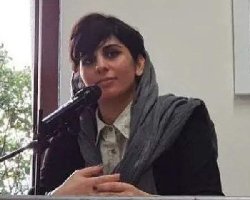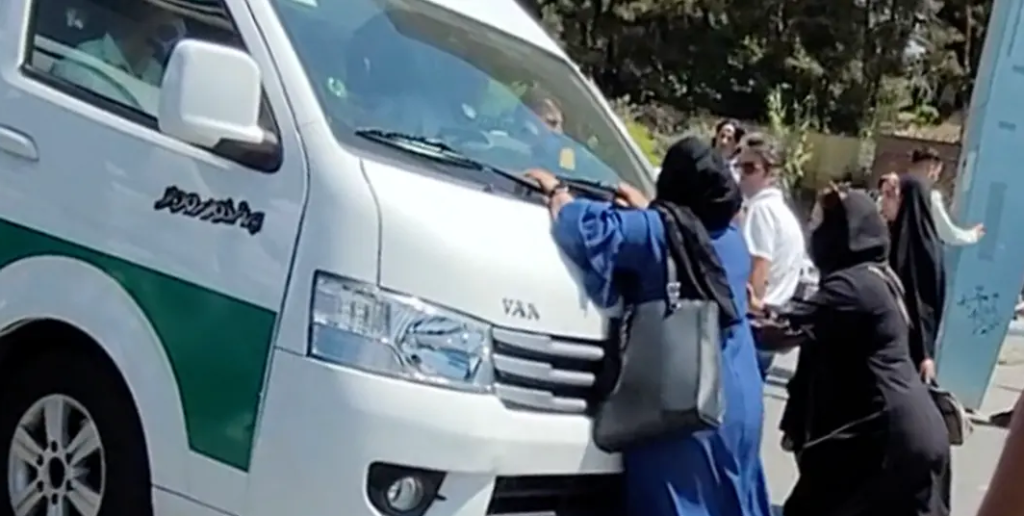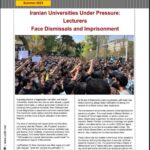
CODIR calls for the international condemnation of the regime’s violation of human and democratic rights in Iran!
Amidst the ongoing wave of brutal repression being meted out by the theocratic dictatorship in Iran towards striking workers and protesters incensed at plummeting living standards, and the country’s descent into an ever-worsening multidimensional crisis, concerns are also growing of a crackdown on limited social freedoms as regime militia and some of the most reactionary elements of its dwindling support base are once more unleashed upon the civilian population, particularly the women of Iran. This has resulted in a growing frequency of ugly incidents involving ‘morality enforcers’, including the recent forcing of a young woman to confess and repent her ‘immoral behaviour’ before the television cameras of the state broadcaster.
Over recent weeks, the Iranian people have borne witness to an emboldening and increased presence in the streets of the dreaded and reviled Gasht-e Ershad, or ‘Guidance Patrols’ (morality police). These units are mandated by the regime to roam the streets and enter public spaces to check upon and enforce adherence to rules and norms on ‘chastity’ and ‘proper behaviour’ under the laws of the Islamic Republic – including the compulsory wearing of hijab for women in public.

These patrols, a notorious feature of life under the Islamist dictatorship after it consolidated its grip on power in Iran in the early-1980s, had become much less commonplace during the previous presidency of Hassan Rouhani (2013 – 2021) – when the Iranian government opted to minimise the scope for such stand-offs given the increasingly agitated public mood. However, against the current backdrop of harsh economic conditions and acute poverty, growing unrest inside Iran, and the regime’s increasing isolation, the illegitimate and ultraconservative president Ebrahim Raisi ordered the full enforcement of hijab laws on Tuesday 5 July.
Following this order, women deemed not to be in compliance have been ejected from public spaces, government offices, and public transport, as well as attacked and harassed by regime militia and supporters in the streets.
Iranian women’s rights activists have responded by launching a social-media campaign with the hashtag #no2hijab to draw attention to those bodies supporting and enforcing the renewed restrictions and encourage people to boycott them. On Tuesday 12 July, coinciding with the regime-declared ‘National Day of Hijab and Chastity’, many women activists in Iran posted videos of themselves online publicly removing their veils.
Further public outrage in Iran has been stoked in recent days following the appearance on national television of 28-year-old artist and writer, Sepideh Rashno, during which she appeared to give a coerced confession to having engaged in ‘immoral behaviour’ and apologised for an altercation with a regime supporter over the removal of her hijab on a Tehran bus. Ms. Rashno blamed herself entirely for the incident, which was caught on video and went viral shortly thereafter. The clip shows a quickly escalating confrontation between her and the chador-clad Rayeheh Rabi’i, who had seemingly taken it upon herself to enforce the rules on mandatory hijab having noticed Ms. Rashno’s uncovered head. Ms. Rabi’i is told by Ms. Rashno and other female passengers to quieten down and mind her own business, but proceeds to insult Ms. Rashno while threatening to pass her own mobile phone footage to the Islamic Revolution Guard Corps. (It has since transpired that the father of Ms. Rabi’i is an officer of the IRGC.) The prevailing public mood is summed up by the disdain shown by the other passengers towards Ms. Rabi’i – with one woman having to stand in front of her to shield her from the blows of other incensed women on board – before they physically eject her from the bus at the next stop.
Ms. Rashno was identified and arrested by security forces two days later. The authorities in Iran claim that Ms. Rashno was permitted one short telephone call to a listed relative, but her family have not heard from her. Judiciary officials informed her family that a legal case has been opened against her in Branch 3 of the Evin Prison Prosecutor’s Office.
Furthermore, on Tuesday 19 July, a disturbing video began to circulate showing a mother crying and pleading with a morality police unit not to arrest her ill daughter. In the video, the mother attempts to stand in front of the police van containing her daughter and continues to tearfully remonstrate with the unit, begging them not to take her frail daughter away, as a crowd of angry onlookers begins to gather around the van. The van moves forward before the mother is pulled aside and left distraught on the ground. This video has also gone viral, provoking widespread anger amongst the public.
Within a couple of days, three reformist-aligned newspapers took the rare step of publishing lines critical of the morality police, calling for their reining in, and warning of an explosion in social unrest otherwise.
Hassan Khomeini, a reformist figure and grandson of the late-founder of the Islamic Republic, took to his Instagram account (where he has 600,000 followers) and re-posted the video with the caption, “Whatever this is, it is not guidance, it is not Islamic, it is not wise and it has no benefit!”
Sensing the public mood, the authorities subsequently climbed down and the Tehran Police Department announced it would be taking disciplinary action against the unit involved in the incident.
The spectre of forced televised confessions and repenting harks back to the darkest chapters in the history of the Islamic Republic, bringing dread to so many Iranians. This has been a notorious tool deployed by the theocratic dictatorship in its four-decade-long existence, with scores of political prisoners brutally tortured or heavily drugged and then brought before television cameras to confess, recant, and beg forgiveness for their ‘sins’. Sepideh Rashno’s own forced confession will have manifold and profound implications for her reputation, livelihood, welfare, and safety in Iran.
These latest developments should not be read in isolation from the recent statement of the Islamic Republic’s Supreme Leader, Ayatollah Ali Khamenei, in which he ominously sought to invoke the supposedly revolutionary spirit of 1981. (1981 was the year the theocratic regime embarked upon its ‘cultural revolution’ and consolidated its grip on power by bloodily moving against its main non-regime political rivals.)
“In the year 1981, the Iranian nation was able to frustrate the enemy by adhering to the most divine traditions, namely those of jihad and resistance […] Today, the same rules and laws are in force, and God in the year 2022 is the same God he was in 1981.” Khamenei stated during a speech on 28 June.
CODIR condemns the latest round of fierce repression being unleashed by the theocratic regime upon the long-suffering people of Iran and those bold and courageous enough to make a stand.
CODIR is appalled to bear witness to the extension of this repression once more to the few social freedoms remaining in the public sphere in Iran, freedoms that so many people around the world take for granted.
CODIR stands alongside the women of Iran against the renewed enforcement of mandatory hijab, one of a long list of misogynist policies enforced ruthlessly by the Islamic Republic.
We unequivocally condemn the practice of extracting forced confessions and recantations from opponents of the regime and its policies, and the perpetuation of these ordeals by filming and televising them.
Finally, we call for the immediate and unconditional release of Sepideh Rashno as well as all those detained in the recent clampdown. We call upon all those concerned with women’s rights to show solidarity with women in Iran and make their protests in writing to the embassies and missions of the Islamic Republic of Iran.













 Posted in
Posted in 











